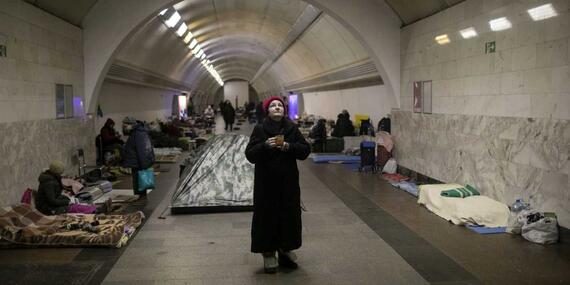Today's top news: Ukraine, OPT, Niger, Myanmar

Ukraine
A new wave of airstrikes this morning killed and injured civilians and damaged civilian infrastructure, mainly energy, in the capital Kyiv and at least five regions of the country.
Millions of people are facing additional power outages, mainly in Kyiv, Odesa and Vinnitsa regions. The targeting of energy infrastructure may constitute a serious violation of international humanitarian law.
In Odesa, our colleagues on the ground say the entire city of roughly 1 million people was temporarily left without water. As fighting continues, the consequences of the airstrikes for civilians are dire. Across Ukraine, over 18 million people need humanitarian aid.
Our Humanitarian Coordinator Denise Brown has announced the release of $50 million from the Ukraine Humanitarian Fund to support critical activities in eastern and southern Ukraine.
We thank our donors for their contributions to this Fund, including Germany, Canada, the United Kingdom, Switzerland, Netherlands, the United States, France, Norway, Australia and Denmark. In 2022, the Ukraine Humanitarian Fund received more than $327 million, making it the largest Country-Based Pooled Fund managed by OCHA.
Occupied Palestinian Territory
The UN and our partners today launched a US$502 million appeal to help 1.6 million of the most vulnerable people there.
The 2023 Humanitarian Response Plan estimates that 2.1 million Palestinians across the occupied Palestinian territory need humanitarian assistance. They represent 58 per cent of Gaza residents and one quarter of people in the West Bank.
The plan comprises more than 200 projects, which will help people access essential services, such as food, water, health care and education, as well as ways to earn a living and support to improve their mental and physical wellbeing.
The lack of livelihoods opportunities across the occupied Palestinian territory is a main driver of dependence on humanitarian aid and increasing vulnerability.
Niger
Deputy humanitarian chief Joyce Msuya yesterday visited the Ouallam commune in western Tillaberi region on the border with Mali and Burkina Faso.
Ms. Msuya said she was moved by the resilience and unity of people she met, including internally displaced people, refugees and members of the host community.
This year, the UN is appealing for US$584 million to provide humanitarian assistance to 2.7 million people in Niger. The total number of people in need in Niger has more than doubled in the past few years, from 1.9 million in 2017 to 4.3 million in 2023.
The needs are driven by displacement due to violence, the climate crisis, high poverty and low levels of development.
Earlier in the week, Ms. Msuya participated in the third Lake Chad Conference where more than $500 million was announced by donors to support the crisis in the Lake Chad Basin.
Ms. Msuya continues her visit to Niger where she is meeting Government officials, partners and civil society representatives.
Myanmar
The UN and our partners yesterday launched an appeal for $764 million to provide life-saving support to 4.5 million people this year.
Presenting the 2023 Myanmar Humanitarian Response Plan, the Acting UN Resident and Humanitarian Coordinator Ramanathan Balakrishnan predicted a challenging year ahead for both crisis-affected people and the responding aid workers.
One third of those we are aiming to help are children, 13 per cent live with a disability, and 1.6 million are displaced.
Last year, we assisted 3.9 million out of 6.2 million people targeted – or more than 60 per cent of the people we intended to reach.
